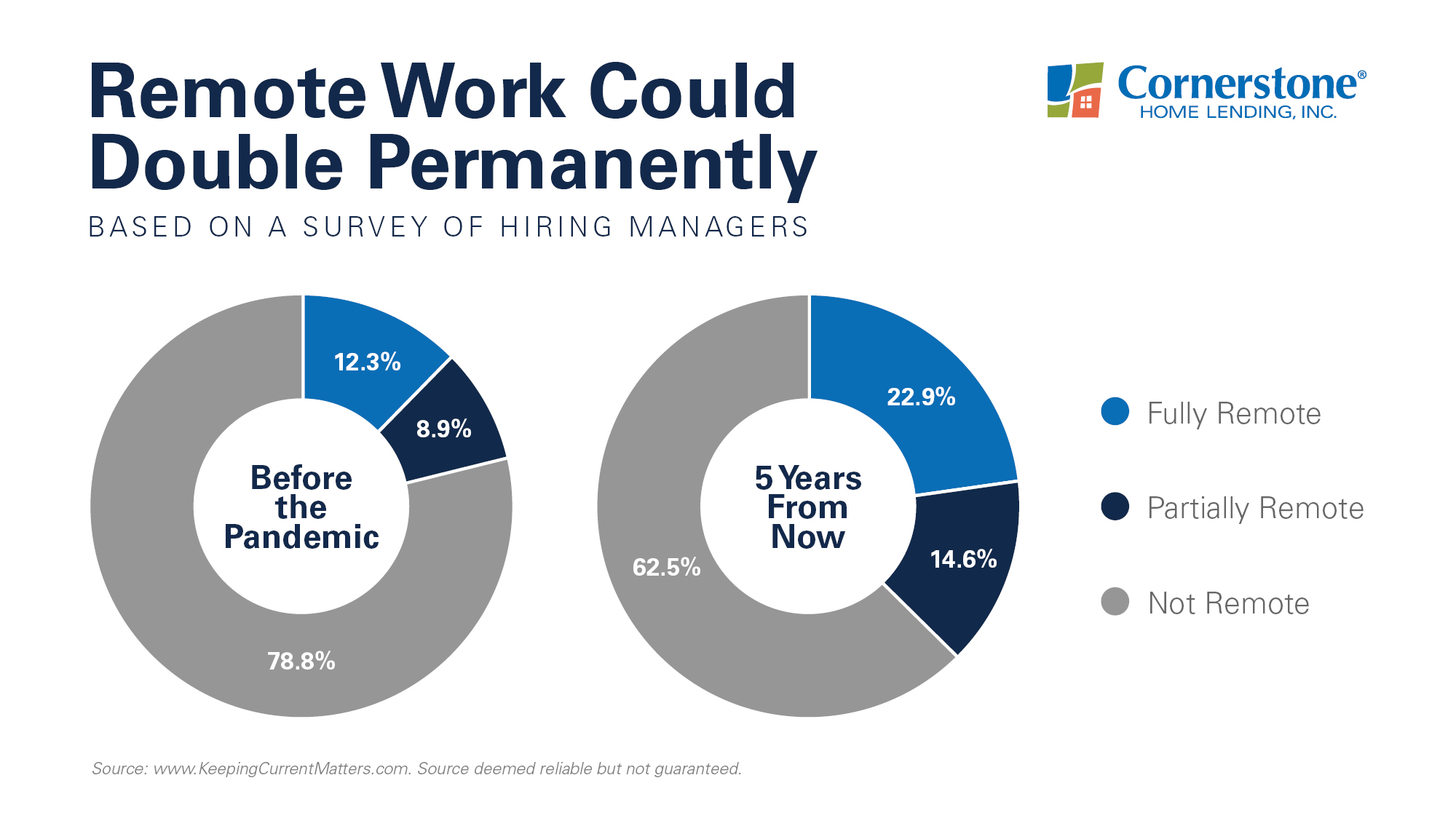So much has changed within the last year. As many people discovered, the move to remote work impacted their home search, driving up demand for more home office space.
For some professionals, transitioning to remote work presented an ideal opportunity, and they took advantage, buying a bigger house or even moving to a more desirable location. Others saw working remotely as temporary, so they tried to creatively utilize the space they had available.
But the latest headlines now show: Remote work is the new normal.
If you’re still in need of dedicated space for your home office, now could be the time to find a house with more square footage that suits your work-from-home needs. More companies continue to put off plans to bring workers back to the office; others are opting to telecommute permanently.
Talk about easy. You can prequalify for your new home online.
As Goldman Sachs economists recently explained in a CNN article:
“Job ads increasingly offer remote work, and surveys indicate that both workers and employers expect work from home to remain much more common than before the pandemic.”
Many experts are in agreement. Upwork’s survey of 1,000 hiring managers confirmed that, because of the pandemic, companies were preparing to accommodate more virtual work today and in the years ahead.
Upwork stated:
“The number of remote workers in the next five years is expected to be nearly double what it was before COVID-19. By 2025, 36.2 million Americans will be remote, an increase of 16.8 million people from pre-pandemic rates.”
This chart illustrates the findings, comparing pre-pandemic and forecasted numbers:

So, what does this mean for you if you’re a homeowner? It’s critical to underscore that the continuation of remote work may present you with much more autonomy. Since you no longer have to stay in a certain area to go to work, you’ll now have greater flexibility in choosing where you live.
Let’s say you’re one of the almost 23 percent of individuals who will keep working 100-percent remotely:
- You could move to a different neighborhood, city, or state with a lower cost of living.
- When you search for homes in a more affordable location, you’ll get more bang for your buck. This can make it easier to afford a larger house with a home office (and even a home gym).
Or perhaps, after weighing your options, you’re ready to jump at the chance to move to your dream location. The mountains, the beach, or simply closer to friends and family. Without your job keeping you “landlocked,” you’ll have much more freedom in hand-picking the place you call home.
The Counselors of Real Estate’s (CRE) report, Top Ten Issues Affecting Real Estate, found that:
“. . . after years of apparent but variant trends towards urbanization, the pandemic universally caused a movement away from urban cores, particularly for those with higher incomes who could afford to move and for lower-income individuals seeking lower costs of living.”
Let’s say you’re one of the nearly 15 percent of people who will remain on a hybrid (partially remote) schedule:
- It could still be a great time to relocate farther from your office while staying in your area.
- You won’t have to drive to the office each day. So, moving to a more rural region or to a suburban neighborhood with better amenities could be worth the trade-off for an extended commute.
It’s true that the data shows that homeowners are staying in their homes longer than in years past — an average of 10.6 years today compared to five years before 2008. But the longer you’ve lived in your house, the greater the odds that you’ve outgrown the home you’re in.
We’re spending more time at home than ever, especially for those of us working remotely. Now’s the time to ask the tough questions and determine if your current home – and location — can really meet the evolving needs of you and your family.
Selling now is likely to be financially beneficial. One of the biggest advantages of being a homeowner is that you automatically build equity with time. If you’ve lived in your home for a few years, you may be unaware of how much equity you’ve accumulated. In the past year alone, the average homeowner has seen a $51,500 equity increase.
Couple this equity gain with today’s historically low mortgage rates, and you may find it effortless to afford a home in a new location or a higher price range.
Have your needs changed since you’ve started working remotely?
We can help. Whether you’d like to trade up to a larger house with a home office, downsize to lower your monthly housing expense, or relocate to a brand-new area: Reach out to a local loan officer to get the personalized service you’ve been looking for.
For educational purposes only. Please contact your qualified professional for specific guidance.
Sources are deemed reliable but not guaranteed.

